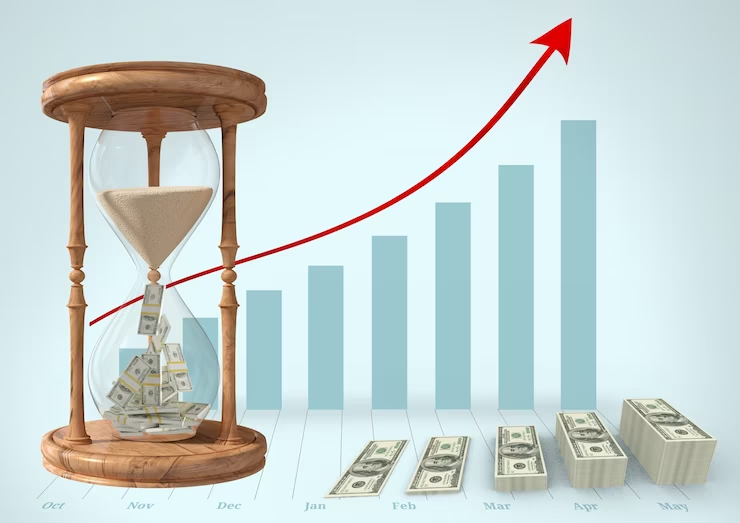The Impact Of Inflation On Your Financial Health

Image Credit: Freepik
Have you ever heard the term "inflation"? Although it is a word we frequently hear in the news, it is not always clear what it means or how it relates to us.
Simply put, inflation is the gradual rise in the cost of goods and services. In other words, as inflation increases, the purchasing power of our money decreases.
While some inflation is acceptable and even beneficial to a thriving economy, too much inflation can be detrimental to our ability to manage our money. This may make it challenging to fulfill financial commitments and achieve long-term financial goals.
Thus, it is important to understand how inflation affects our financial health and take action to mitigate those effects by creating a budget, obtaining a secured credit card, and improving your credit score.
Therefore, let's plunge right in and see how inflation can impact your finances.
1. Reduced Purchasing Power

Image Credit: iStock
Have you ever noticed how prices for goods and services appear to rise constantly? It results from inflation, which is the deterioration of the purchasing value of money over time.
In other words, when the price of products and services rises, so does the money required to maintain your current standard of living.
This decrease in purchasing power can have severe consequences for your financial stability. It can make it more challenging to afford necessities such as
- Food
- Housing
- Healthcare
People on fixed incomes, such as pensioners or those reliant on government assistance, may find this incredibly challenging. Additionally, reaching your long-term financial goals, such as home ownership or retirement savings, can make it more difficult.
For instance, if you have $1,000 in savings and the annual inflation rate is 2%, your money will only be able to buy the same amount of products and services that $980 could have in the prior year. This indicates that the value of your money has decreased due to inflation.
2. Reduced Investment Returns

Image Credit: Freepik
Inflation can also have a detrimental impact on investment returns. As the cost of goods and services rises, the value of your investments may erode, resulting in lower returns.
Hence, businesses might have to spend more on things like labor and raw materials, which could lower their profitability. This can lead to lower returns for investors, particularly those who invest in stocks or bonds.
For instance, the real return on your investment is only 1% if you invest $10,000 in a bond with a 3% interest rate, and inflation is 2%. This signifies that the purchasing power of your investment has diminished owing to inflation.
3. Higher Interest Rates

Image Credit: iStock
Another impact of inflation on your financial health is higher interest rates. However, increasing interest rates can be beneficial as well as detrimental.
- On the one hand, they may indicate a healthy economy, which is excellent news for your investments and employment prospects.
- On the other hand, increased interest rates may also result in more significant borrowing costs (such as those associated with a mortgage or car loan).
Your savings account is one way that increasing interest rates can directly affect your finances. The interest rate you receive on your balance may increase if you have funds in a high-yield savings account. This could be beneficial because it would accelerate the growth of your savings.
For instance, if you have a variable-rate mortgage and interest rates rise due to inflation, your monthly mortgage payments will also rise.
Nevertheless, while rising interest rates might be a mixed blessing, the most important thing you can do for your financial health is to stay knowledgeable and in control of your money.
4. Increased Uncertainty

Image Credit: Freepik
A rise in the price of goods and services over time is generally meant by inflation. This can make it challenging to plan for the future, particularly regarding finances. It might be challenging to plan a budget and save money when you can never predict how much something will cost in the future due to inflation.
For example, if you are going to launch a business but are unsure about the future cost of raw materials or labor, it might not be easy to make pricing or profitability decisions.
Inflation can also influence your financial planning and investments. Your investments may lose value if inflation is high, and you may not even be able to achieve the return you had hoped for. This is particularly concerning if you rely on your investments to fund your retirement or other long-term financial goals.
This uncertainty can have a ripple effect throughout the economy, increasing volatility in financial markets and making informed investment decisions more difficult. Also, it may affect job security and make salary negotiations more difficult.
5. Higher Cost of Living

Image Credit: Freepik
Have you ever felt that your money is not going as far as it once did? It is not your imagination; the rising cost of living is a genuine problem that impacts us all.
The rise in prices over time, or inflation, can significantly affect your financial situation. In other words, while your income stays the same, the price of the goods and services you need keeps rising.
This may affect your spending plan, lessen your purchasing power, and make it more challenging to make your life better financially.
As a result, you might need to make some difficult decisions, such as reducing expenses or using funds to cover expenses.
For instance, if you have a low salary, but inflation is high, you might find that basic necessities like food and accommodation are out of your price range. This could make it harder for you to meet ends and hurt your financial situation.
Mitigating the Impacts of Inflation on Your Financial Health

Image Credit: Pexels
Although inflation can hurt your financial status, there are things you can do to lessen the effects.
Here are some strategies to make our money work for us instead of letting inflation work against us.
1. Invest in Assets That Increase in Value
Investing in assets with a long-term appreciation potential is one strategy to lessen the effects of inflation. These can include assets like
These kinds of assets might serve as an inflation hedge since they might appreciate in value as the price of goods and services rises.
2. Diversify Your Investments
Another way to lessen the effects of inflation is to diversify your financial portfolio. You can lessen your exposure to any one asset that might be negatively impacted by inflation by distributing your investments among a variety of assets.
This can help guard your entire financial portfolio against the unfavorable effects of inflation.
Also Read: How To Choose The Right Investment Strategy? Complete Planning Guide!
3. Consider Investing in Inflation-Protected Securities
Another option to shield your investments from the damaging impacts of inflation is to purchase inflation-protected securities, such as Treasury Inflation-Protected Securities (TIPS).
These assets are intended to deliver an inflation-adjusted return, which can assist in protecting your purchasing power.
4. Focus on Increasing Your Income
Raising your salary can also assist in reducing the adverse effects of inflation on your finances. You can achieve this by seeking education or training that can lead to higher-paying jobs or by launching a business that has the potential to bring in more money eventually.
You can better manage the additional costs connected with inflation by raising your income.
5. Consider Investing in a Retirement Account

Image Credit: Freepik
Finally, you can lessen the effects of inflation by making investments in retirement accounts like
These accounts are made to offer steady growth over the long term and can aid in shielding your savings from inflation.
Related: What To Do Before Retirement? 13 Tips To Ace Your Savings
Conclusion
That concludes our discussion of how inflation affects your financial situation. We have learned that inflation is a standard component of a healthy economy, but too much inflation can harm your financial health.
It can significantly impact your spending power and your financial security, but there are steps you can take to protect yourself.
One smart move is to consider using a secured credit card, which can help you to save yourself from high inflation while helping you create or rebuild your credit.
Remember that the key to avoid financial mistakes is to stay informed about inflation rates. You can position yourself for success and weather any financial storm that may come your way by taking charge of your finances and looking for the correct tools and resources.
So, do not wait until it is too late. Start taking action today to manage inflation and improve your finances.
Your wallet (and future self) will thank you!


